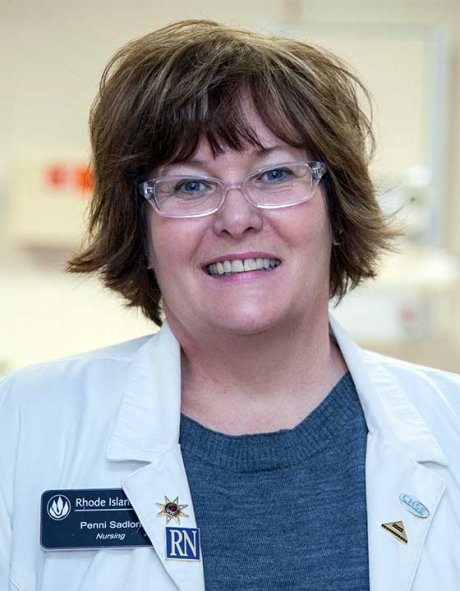RIC Simulation Coordinator Awarded for Excellence
- News & Events
- News
- RIC Simulation Coordinator Awarded for Excellence

For excellence in pioneering, advocating and championing clinical simulation training at Rhode Island College, Simulation Coordinator/Educator Penni Sadlon has been recognized by Education Management (EMS) Solutions, LLC.
Last month EMS presented Sadlon with the 2016 Champion Award at the San Diego EMS International Meeting for Simulation in Healthcare. This award honors one individual who has actively championed state-of-the-art simulation-related technology for a simulation center.
Sadlon has led efforts to incorporate simulation throughout the undergraduate and graduate curriculum at the Rhode Island College School of Nursing. She also developed a graduate assistantship in simulation for nurse practitioner students and will be incorporating clinical nurse specialist students in the upcoming academic year. Under her tenure, RIC’s Simulation Center and Nursing Resource Lab received accreditation in teaching and education from the Society for Simulation in Healthcare in 2014.
The purpose of simulation is to give students the opportunity to experience clinical situations they may not otherwise encounter in their clinical practicums.
At the RIC Simulation Center, Sadlon and her team conduct more than 20 different simulations each semester, ranging from pediatrics to adults.
“I work with student nurses very closely and take them slowly into the full spectrum of simulations,” said Sadlon. “We observe, assess, make a plan, implement the plan and finally we evaluate outcomes.”
Following each simulation, Sadlon facilitates a debriefing with the student nurses. “It’s almost like a counseling session,” she explained. “Students learn by seeing, speaking it for themselves and hearing themselves speak. I want them to reflect on what happened, why it happened and why they made certain decisions.”
Simulation is a fairly new method of experiential learning, with only 50 percent of schools in the United States developing simulation programs, said Sadlon, who worked as a nurse for 30 years before coming to RIC as simulation coordinator/educator. Moreover, these programs are not simply confined to the purview of nursing education but used in the education of medical, pharmacy and social work students and is the preferred method of conducting annual competencies.
“The healthcare simulation community is a multidisciplinary community of professionals from around the world,” Sadlon said. “By sharing our work, we have developed ongoing evidence-based knowledge that informs practice solutions.”
“I am proud to share the EMS Champion Award with my colleagues and mentors who work as a team in the School of Nursing,” she said. “It is gratifying to know that our efforts have been recognized by our peers nationally and internationally.”
